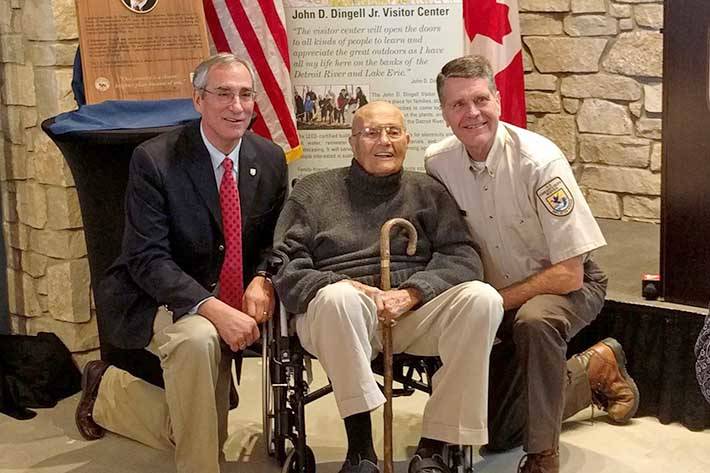Last month, John D. Dingell Jr. passed away. He represented Michigan in the U.S. House of Representatives from 1955 through the next 60 years, making him the longest serving member of Congress. Over his 92-year life, Dingell was a congressional page, a National Park Ranger, a Second Lieutenant in the U.S. Army during World War II, an assistant county prosecutor, and always an avid angler and hunter.
Dingell championed conservation and public health during his time in the House. He was instrumental in passage of the 1964 Wilderness Act, 1965 Water Quality Act, 1970 National Environmental Protection Act, 1972 Clean Water Act, 1973 Endangered Species Act, 1974 Safe Drinking Water Act and the 1990 Clean Air Act. He was reportedly most proud of his work on the Civil Rights Act of 1964.
Dingell authored the Refuge Administration Act of 1966 and sponsored the Refuge Improvement Act in 1997, which are the laws that established the National Wildlife Refuge System.
He later helped establish the Detroit River International Wildlife Refuge, a refuge that lies along the border between the U.S. and Canada. Conceived in 2000, it took just nine months after Dingell introduced a bill to establish the refuge for President George W. Bush to sign it into law. The refuge’s visitor center, currently being built, will bear Dingell’s name.
To honor his legacy, President Trump just signed into law what is now called the John D. Dingell Jr. Conservation, Management and Recreation Act, perhaps the single-most important and wide-reaching public lands legislation since the 1970s.
The act packages 120 or so bills. It permanently authorizes the Land and Water Conservation Fund, which devotes a portion of revenues from offshore oil and gas extraction leases to fund a variety of public access to public lands programs nationwide.
The Dingell Act also creates three Wilderness areas in New Mexico. It adds 60 miles of the Green River in Utah and the Farmington River in Connecticut to the National Wild and Scenic Rivers System. It permanently withdraws federal mineral rights from two areas adjacent to Yellowstone and North Cascades national parks.
It reauthorizes the Partners for Fish and Wildlife Program, and the Neotropical Migratory Bird Act, both through 2022. A 21st Century Conservation Service Corps will be established, the purpose of which is to create programs for youth and veterans who will work to restore national parks and other public lands.
Ten of the bills in the Dingell Act are specific to Alaska. They range from the Kake Timber Parity Act, which allows the Kake Tribal Corporation to export unprocessed logs, to the Ukpeagvik Land Conveyance, which will give the North Slope community a new revenue source by conferring rights to sand and gravel within the Barrow Gas Field to the Ukpeagvik Iñupiat Corporation.
Perhaps the most significant piece is the Alaska Native Veterans Land Allotment Equity Act, which will allow Alaska Native veterans (or their descendants) to apply for their 160-acre allotment, guaranteed by a 1906 law, because they missed the original opportunity while they were serving in the Vietnam War.
What I find amazing is that John Dingell Sr., his father, also served in House for 22 years. Unknown to many who fish in public waters, Dingell Sr. helped create a foundational mechanism for funding fish habitat conservation, public lands access, recreational facilities maintenance and other conservation programs like angler education services.
With Sen. Edwin Johnson of Colorado, he co-authored the Dingell–Johnson Act, also called the Federal Aid in Sport Fish Restoration Act of 1950. It authorizes the Secretary of the Interior to provide financial assistance for state fish restoration and management plans and projects.
Federal funds are generated by a 10 percent excise tax on sportfishing and boating equipment, and a 3 percent tax on fish finders and electric trolling motors.
The Dingell-Johnson Act was modeled after the Pittman-Robertson Act, also called the Federal Aid in Wildlife Restoration Act of 1937. That act imposed an 11 percent excise tax on firearms and ammunition that are apportioned by the Department of Interior to state wildlife agencies for their conservation efforts, hunter education programs, and operation of archery and shooting ranges. Both acts require a 25 percent match by the state receiving the funds.
The money these two acts generate is not chump change. In fiscal year 2018, Alaska was eligible to receive $17.6 million in Dingell-Johnson funds and $33.5 million in Pittman-Robertson funds. Over the lifetime of these two laws, they have collectively generated $20 billion for fish and wildlife conservation nationwide!
Clean water to drink, clean air to breathe, the recovery of once-endangered peregrine falcons and the existence of Kenai Wilderness within the Kenai National Wildlife Refuge are just some of the legacies of John D. Dingell Jr. In May 2014, the National Wildlife Refuge Association recognized the vast contributions of Dingell Jr. by awarding him the inaugural Theodore Roosevelt Lifetime Achievement Award. I can’t imagine a more deserving conservation hero.
Dr. John Morton is the supervisory biologist at Kenai National Wildlife Refuge. Find more Refuge Notebook articles (1999-present) at https://www.fws.gov/Refuge/Kenai/community/Refuge_notebook.html.

